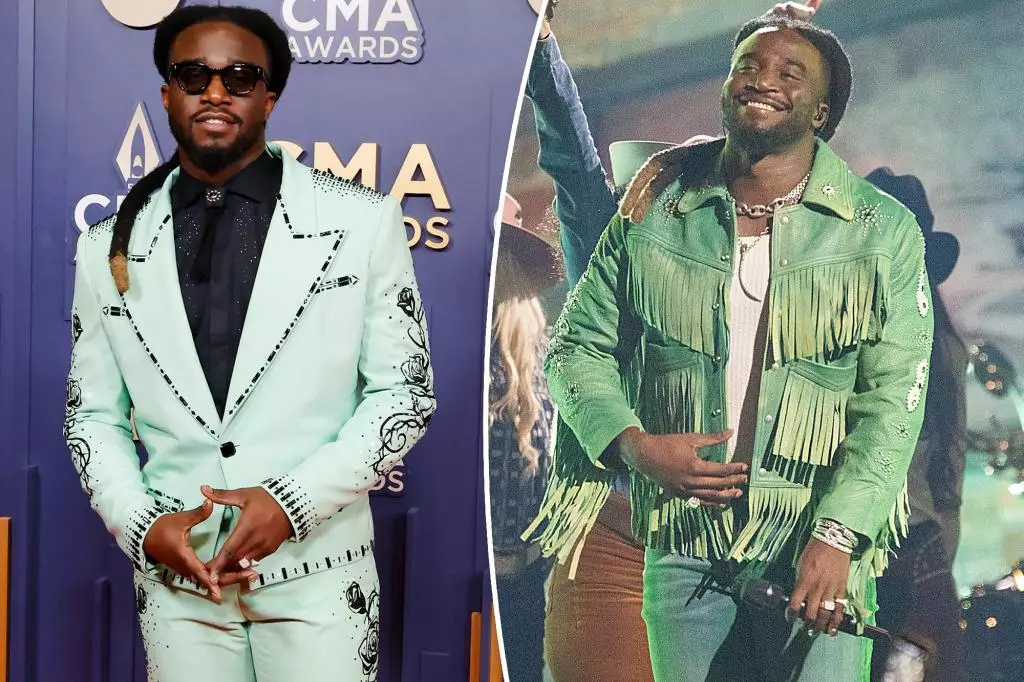In a world increasingly focused on promoting diversity and inclusion, the recent snubbing of Shaboozey at the CMA Awards raises significant questions about the sincerity and effectiveness of the country music industry’s efforts to embrace diverse voices. Despite the undeniable success of his hit song “A Bar Song (Tipsy),” which made waves on the Billboard Hot 100 by securing the title of the longest-running solo No. 1 in its history, Shaboozey was left empty-handed at the awards show. The contrasts between his achievements and the recognition afforded to him reflect a deeper issue within the genre.
Shaboozey, at just 29 years old, has established himself as a formidable force in country music, gaining fame not only for his solo endeavors but also for his contributions to Beyoncé’s “Cowboy Carter.” His evolution as an artist symbolizes a significant shift in the genre’s landscape—one that includes a rising number of Black artists and varied musical influences. With “A Bar Song (Tipsy)” enjoying an impressive duration at the top of the charts, his nomination for two prestigious awards—the New Artist of the Year and Single of the Year—seemed a well-deserved acknowledgment of his efforts and popularity. Instead, it served as a stark reminder of the obstacles that continue to exist for artists of color in predominantly white spaces.
The reaction from fans and observers regarding Shaboozey’s losses at the CMAs was swift and scathing, highlighting a perceived lack of authenticity in the awards’ commitment to diversity. Comments on social media reflected a common suspicion that Shaboozey’s inclusion as a nominee was merely a performative tactic aimed at mitigating criticism of the CMAs’ past racial exclusions. Many argued that the industry is grappling with systemic biases that favor white artists, a sentiment echoed by numerous fans who noted that Shaboozey’s exceptional track record did not translate into tangible recognition.
Critics also drew attention to the broader implications of his losses for Black artists within the country music scene. Historically, country music has often sidelined talent that doesn’t fit the traditional mold, making Shaboozey’s experience feel like a microcosm of the larger struggles faced by Black artists in the industry. This ongoing exclusion raises doubts about the genuine commitment of prestigious awards shows to foster an inclusive environment.
Shaboozey’s situation mirrors that of Beyoncé, whose contributions to the country genre were met with skepticism and barriers that prevented her from receiving accolades. As fans pointed out, the advice given to Beyoncé by Luke Bryan—to immerse herself in the culture of Nashville for greater acceptance—rings hollow considering Shaboozey’s own attempts to navigate these expectations. He played by the rules, only to find that they were rigged against him.
The frustration expressed by Shaboozey’s followers stems from a broader trend of advocacy within the industry that often fails to materialize into meaningful change. Despite a banner year for Black artists in country music, the lack of awards recognition for those who break boundaries, like Shaboozey, raises serious questions. Critics posited that the CMAs seem to have a superficial approach when it comes to embracing this change—nominating artists without the intent to ensure they have a fair chance at winning.
The CMAs’ recent decisions could hinder the progress being made towards inclusivity. As Shaboozey’s fanbase continues to grow and influence within the genre expands, the hope is that industry gatekeepers will acknowledge and reward the diverse contributions of all artists, rather than simply choosing to highlight them during awards season while withholding recognition where it counts.
To prevent further backlash and foster an environment where artists of color feel genuinely valued, it’s essential for the country music industry, including entities like the CMAs, to reflect on their actions and engage in dialogue with the communities they aim to represent. The success of artists like Shaboozey is a clarion call not only for recognition but for a reimagining of what country music can be—an inclusive genre that celebrates talent, regardless of race or background.

